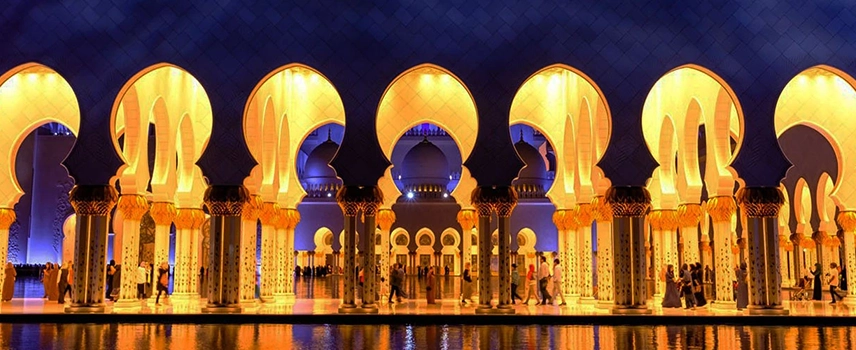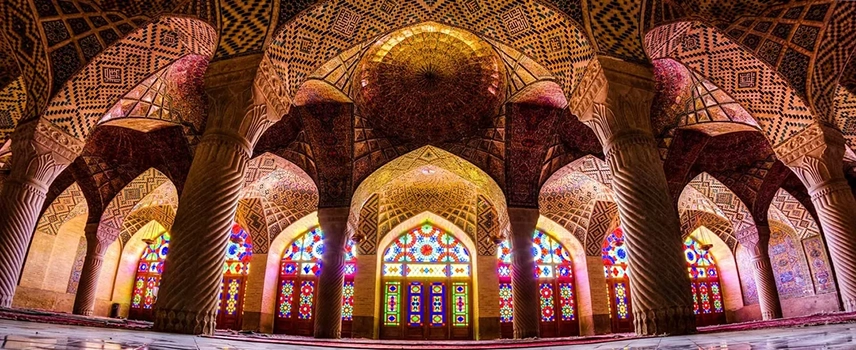Guide to Islamic culture for travellers
“A guide to Islamic culture, laws and traditions for travellers to Islamic countries”
by Alex Bomberg | 17th October 2019

It is often difficult for those planning travel to Islamic countries to get good information on the culture, the traditions and what is considered appropriate behaviour. We hope that this Guide to Islamic culture for travellers will help give you the confidence to travel in Islamic countries around the world.
To start with, we should point out that Islamic countries differ greatly and each follows its own degree of Muslim Sharia Law. Saudi Arabia, the spiritual home of Islam is by far the strictest whilst in some other countries things are more relaxed.
The best travel advice is to not push boundaries. Just because an Islamic country is relaxed about tourists drinking and allowing the wearing of revealing swimwear, that does not mean that one should not dress respectfully when not by the pool or at the beach.
Top travel tips for visiting Islamic countries
1. Do not draw attention to yourself
2. Check local laws and customs
3. Do not consume alcohol in public
4. Do not show affection in public
5. Men should not greet Muslim women by shaking hands
6. Avoid discussing politics
7. Dress conservatively at all times
8. Women should cover their shoulders, arms and legs when in public
9. Women should cover their hair when in public
10. Be aware of religious holidays such as Ramadan
Culture is very important in Islamic countries. The best advice for travellers is ‘do not behave inappropriately just because someone else is’.
Holidays, observances, local laws and customs
Religious holidays and observances in the Islamic calender such as the Holy Month of Ramadan are highly important. If you are travelling during this time, there will be a number of laws that you will need to respect such as Eating, drinking, smoking, playing loud music and dancing in public places during daylight hours of Ramadan. During Ramadan, Muslims fast from dawn to sunset, Ramadan is observed in all Islamic countries and is at the heart of the faith, being one of the five pillars of Islam.
One complicating factor when travelling is that what is acceptable in one Islamic country, might not be acceptable in another. We would strongly advise to check for local laws and customs with your Embassy or Consulate.
If in doubt, think conservative!

The Islamic World
There are many countries around the world who consider themselves as Islamic with many of these countries having declared Islam as the official state religion. In those countries, the legal code is largely secular. Official figures from 2017 state that 1.8 billion people make up the Islamic world.
The following countries are considered countries that have adopted Islam or where there is a large Islamic presence:
|
|
|
|
Being non-Muslim in Islamic countries
Islam is a relatively new religion being founded 600 or so years after Christianity, so Islam has had to exist alongside other religions in countries where it has gained foothold.
The best advice is to avoid wearing religious symbols in Islamic countries, as doing so may attract unwanted attention.
In recent history, Christian churches have been attacked, such as the 2019 Easter bombings in Sri Lanka that saw over 250 worshipers killed. Be vigilant visiting such places and report any activity that may be of concern.
Like politics, avoid any conversations or debate about religion, so to avoid conflict.
Food, drink and behaviour in Islamic countries
A big misconception is that Islamic countries do not allow pork-based foods or alcohol, many do allow either or both, but under control.
Some Supermarkets in Islamic countries have curtained off rooms where they will sell pork-based foods.
Behaviour that we might find acceptable in Western culture may not be seen as acceptable in many Islamic societies, where there are more conservative.
Public shows of affection such as kissing and drunken behaviour is not acceptable and in most cases, will lead to arrest and possible fines or imprisonment.
Drinking is permitted in many Islamic countries but is strictly controlled and only permitted in Hotels and Resorts for example. It is not advisable to take alcohol into public areas as this too may lead to arrest.
How you dress in the Islamic world is really important. For women, it can be very strict (more on women later) and for men too, it is important to understand what is acceptable.
Every country is different, so it is important to understand local laws and customs. A country may have relaxed laws on swimwear, but just because you can wear Bikinis, swimsuits, revealing tops and shorts by the pool or at the beach, it does not mean that it is acceptable to wear these close in public, away from those areas. The same goes for men showing their chests or wearing shorts in public. At the beach it is fine, but men are expected to dress appropriately.
In fact, in some Islamic nations, such as emirate of Sharjah in the UAE, women are not permitted to wear swimsuits and must be fully covered. In Jordan, it is advised that men wear full length shirts, covering their arms.
Lesbian, Gay, Bisexual, and Transgender travellers in Islamic countries
The subject of Lesbian, Gay, Bisexual, and Transgender (LGBT) is a difficult one across the Islamic world, LGBT is not accepted in Islam and in many cases, State-sponsored homophobia is obvious.
Put very simply, it is not safe to be open about sexual orientation or gender identity in Islamic countries. In 2019, the Asian country of Brunei came under international criticism for enacting strict Islamic laws that made gay sex punishable by flogging or stoning to death. Other countries allow for the death penalty for homosexuality includes Afghanistan, Iran, Mauritania and Saudi Arabia.
Homosexual activity is not only outlawed in Islamic countries, Equaldex, a crowdsourced site that tracks legal protections afforded to the LGBTQ community, states that “Homosexual activity is illegal to some extent in 71 countries”.
We advise that members of the LGBT community take great care when travelling to Islamic countries and would advise against same sexes sharing rooms, so not to draw attention to any personal relationships.
Female travellers in Islamic countries
It would be fair to say that the role of Women in Islamic culture is very much a matter for debate and is very much a contentious issue. In Islamic culture, the woman’s place is seen as in the home, Saudi Arabia has recently relaxed its rules on Women driving, a move that is seen as progression.
Travel alone for women in many parts of the Islamic world is frowned upon and in some countries, may be unsafe. The crime rate of attacks against women in some Islamic countries are high and attacks against Western women are not always taken as seriously as they should be.
A few good tips for women travelling alone is that they should always avoid eye contact with males and that they should try to sit with other women for example on public transport.
How should Women dress in Islamic countries
We would advise in all cases for any women out in public to cover their arms, shoulders and legs down to the ankles, though feet can be bare, sandals are permitted. Underwear should not be visible.
Tight fitting cloths are not advisable and will attract unwanted attention.
Hair should be dry and covered with a scarf, whilst this is not required in many countries, in stricter countries such as Saudi Arabia it is required. Interestingly, in a number of Islamic countries, wet hair is said to suggest sexual availability.
Travellers should be aware that in some cases, dress code extends to air travel. For Iran for example, the Islamic dress code for women takes effect when your airplane crosses into Iranian airspace.